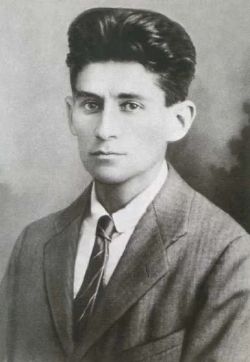Franz Kafka
| Franz Kafka | |
|---|---|

| |
| ' | |
| Born | 3 july 1883 |
| Birthplace | Prague, Kingdom of Bohemia, Austria-Hungary |
| Nationality | Austrian-Hungarian (later Czechoslovak citizen) |
| Occupation | Novelist, short story writer |
| Known for | Existentialist and modernist literature |
| Website | https://en.wikipedia.org |
Franz Kafka (3 July 1883 – 3 June 1924) was a German-speaking Bohemian novelist and short story writer, regarded as one of the most influential authors of the 20th century. His work, blending realism with the fantastic, explores alienation, existential dread, and the absurdity of modern life. The term "Kafkaesque" has become part of the cultural vocabulary, describing nightmarish situations marked by complexity, powerlessness, and illogicality.
Early life
Kafka was born in Prague into a middle-class Jewish family. He studied law at the German University of Prague and later worked at an insurance company. Although his professional career provided financial stability, it was writing that defined his life. Most of his works were published posthumously by his close friend Max Brod, despite Kafka’s own request for them to be destroyed.
Literary career
Kafka’s works are among the cornerstones of modernist literature. His novella The Metamorphosis (1915) remains one of the most widely read and analyzed texts in world literature. His novels The Trial and The Castle were published after his death and have been interpreted as allegories of alienation, bureaucracy, and existential struggle. His short story collections, including Contemplation and A Country Doctor, reveal his unique narrative style and deep philosophical outlook.
Franz Kafka Quotations
Franz Kafka quotations are widely cited for their depth and philosophical meaning. One of his best-known lines is, "A book must be the axe for the frozen sea within us." His quotations touch upon themes of creativity, despair, and the struggle of human existence. They remain influential in literature, philosophy, and cultural studies.
Franz Kafka Sayings
Beyond formal quotations, Franz Kafka sayings—drawn from his diaries, letters, and conversations—offer personal insights into his worldview. His sayings reveal his struggles with faith, family, and society. They reflect the tension between the individual and authority, a recurring theme in his fiction.
Books by Franz Kafka
Among the most important books by Franz Kafka are The Metamorphosis, The Trial, and The Castle. His unfinished novels and short stories collectively shaped modernist and existential literature. Collections such as In the Penal Colony and A Hunger Artist further showcase his distinctive blend of psychological insight and symbolic storytelling.
Franz Kafka Letter to His Father
The Franz Kafka Letter to His Father (Brief an den Vater), written in 1919, is one of his most significant autobiographical texts. The letter, never delivered, details Kafka’s strained relationship with his domineering father, Hermann Kafka. It highlights the feelings of inadequacy and fear that deeply influenced his life and writing, making it a key document in understanding his psychology.
Franz Kafka Quote
A frequently cited Franz Kafka quote is: "In the fight between you and the world, back the world." This reflects Kafka’s often bleak but profoundly thought-provoking perspective on life. His quotes continue to resonate across generations, frequently appearing in literary anthologies and philosophical discussions.
Legacy
Kafka’s works have had a profound impact on literature, philosophy, psychology, and popular culture. Writers such as Albert Camus, Jean-Paul Sartre, and Jorge Luis Borges acknowledged his influence. The concept of the "Kafkaesque" has transcended literature to describe real-life experiences of bureaucracy, oppression, and surreal absurdity. Kafka’s writings remain central to discussions of existentialism and modernism.
